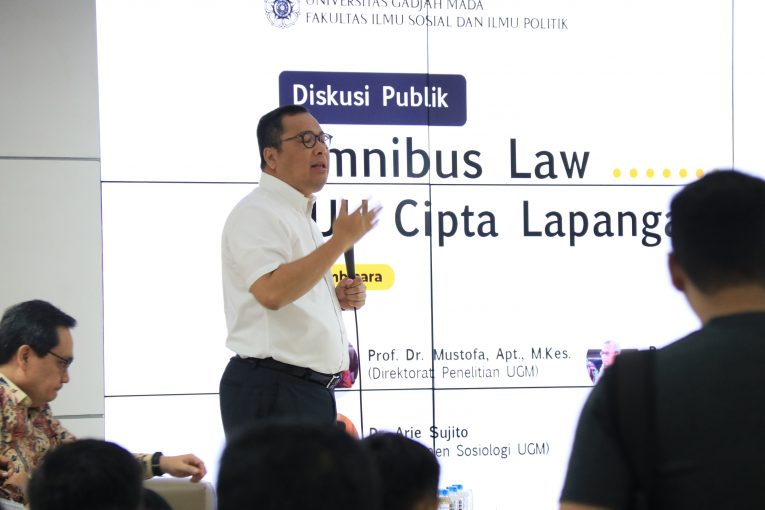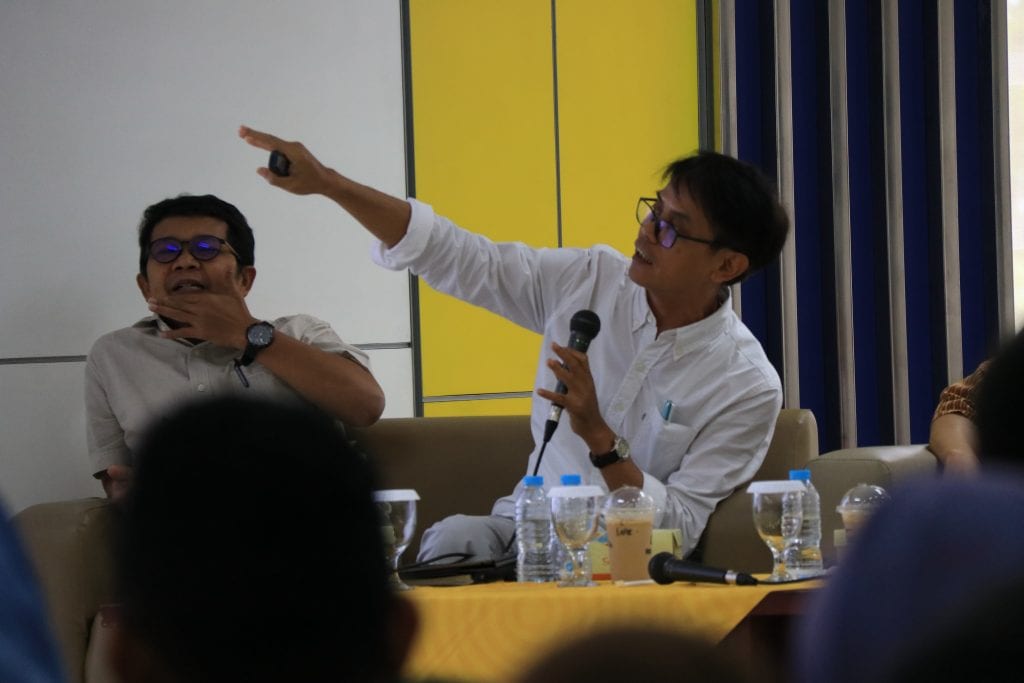
Yogyakarta, March 12, 2020 – Omnibus Bill on Job Creation that reaps public controversy, examined in depth by Faculty of Social and Political Science UGM (Fisipol UGM) with the Coordinating Ministry for the Economy through public discussion occurred in the Auditorium BB Building 4th floor. Arif Budimanta, Special Staff of the President of the Republic of Indonesia, conveyed the urgency of the Job Creation Bill based on the demographic structure. “There is a demographic bonus which we must take because the short limit of time, comparable to South Korea and Japan,” said Arif.
“Why can they advance? Because their cannel of employment creation is not only in the informal sector but in the real formal sector because it provides more certainty. There is a quality of jobs issue that we encounter,” concluded Arif. This issue was also emphasized by Reza Yamora Siregar as the Special Staff of the Republic of Indonesia Coordinating Ministry that with a target of 6-7% annual economic growth and 260 million people, in the next 10 years the gross domestic product per capita can be increased by two-fold.

Furthermore, Reza also emphasized that investment in the context of the omnibus law is not to seize the domestic market, but rather wants to increase the exports and supply chains of Micro, Small, and Medium-sized Enterprises (MSMEs) and cooperatives which reach 90% in Indonesia. “At the moment, the linkage between MSMEs and global value chain has no connection, for example, investment in in West Java is very high but there is no partnership with MSMEs. MSMEs should be used as a support, so if they say they want to benefit investors, it is not possible if 90% of our economic sector exists at MSMEs,” said Reza.
Riza Noer Arfani, Lecturer in the Department of International Relations also criticized that there is a potential moral hazard in the omnibus bill. “It is too naïve to only look at the economy from a horizontal perspective, because through vertical provisions such as investment terms and conditions, there must be a clear priority, for example, focusing on labour-intensive production. If for example environmental permissions are said to be inhibiting, there are industries that are pro-environment but are not countered in the bill. If you want deregulation, why not work with companies because so far the government is working separately and has its own goals which actually obstruct investment,” said Riza.
Moreover, two lecturers from the Department of Sociology namely Tadjuddin Noer Edendi and Arie Sujito, criticized the substance of the bill including the abolition of maternity leave and menstruation, the change of diction “decent” to “prosperous”, the readiness of the bureaucracy, to the extent of institutional consolidation to the perspective of young people regarding the regulations that will facilitate or even entrap them in the future.
In addition to the discussion from the speakers, this public discussion also involved students through the reading of studies from the Student Council or Dewan Mahasiswa (Dema) of Fisipol UGM which stated that aspects of human cost and ecological cost in the bill supposed to be re-examined and in the drafting process need to include public participation, Besides Dema, there were also representatives from the Indonesian Prosperous Labour Union D.I Yogyakarta (Serikat Buruh Sejahtera) dan Gejayan Calling Alliance (Aliansi Gejayan Memanggil) who rejected omnibus law.
Through public discussion as a form of deliberation process of policy formulation, the event which was attended by 300 people expected to produce a critical and comprehensive review of the omnibus law draft. The government represented by Arif Budimanta also appreciated the Gejayan Calling Alliance’s action–which consisted of students and the community–for their contribution in providing study texts consist of constructive suggestion.
